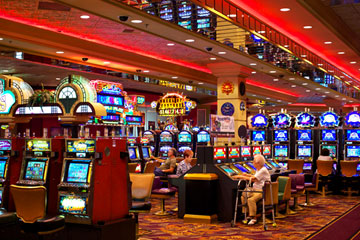
Las Vegas local, Eleanor Kochanski, center right, plays one cent machines in the Penny Lane area of The Orleans casino, in Las Vegas on Wednesday, June 26, 2013.
(4 of 6)
To make things worse, lower gambling revenue has coincided with lower room rates. Vegas rooms are priced on the cruise-ship model--reduce prices until the vessel is full. The average daily room rate in 2012, $108.08 according to the Las Vegas Convention and Visitors Authority, was 18% lower than five years earlier--a consequence of adding 13% more rooms during a recession. This place is an insane value: you can get a room for $150 a night that would cost three or four or five times as much in other major cities. This has led to another problem: budget-minded travelers piling into cheap rooms in five-star hotels without making a donation in the casino. They arrive with cases of beer in tow. The hoteliers loathe them.
It's certainly a lot easier for consumers to adjust their spending than it is for casinos, with their expensive fixed assets. Says Keith Smith, CEO of Boyd Gaming and a member of the San Francisco Federal Reserve Board: "We had not seen this in our business model: visitation dropped, spending dropped significantly more. For the first time in my career we experienced negative operating leverage." When variable costs can't be cut any further, your losses multiply the longer you are open. A forensic analysis by Macomber for the University of Nevada at Las Vegas found that daily gambling revenue per occupied room dropped 14% from 2007 to 2012. Meanwhile, the total cost of running these entertainment engines rose 32% in the same period. Bottom line: a $5.2 billion swing, from a profit of $3.6 billion in 2007 to a $1.6 billion aggregate loss by 2011. "Not pretty," Macomber says.
The irony is that Las Vegas has never been more popular as a destination. "When you attract 40 million people, you've got to extract something from them," notes Aguero. "But they are not coming here to gamble. They are coming here to see Las Vegas." That would include people like Fran DiLeonardo from the New York area, a typical visitor who spent a few token dollars in the slots and moved on. "I'd rather buy something than gamble," she says. "I want to walk away with something."
Getting Religion on Costs
Since the Meltdown, Casino operators such as Boyd and Caesars have been doing everything they can to get more efficient. Boyd employs more automation in restaurant booking and centralized room reservations, for instance. And it uses its mobile platform, B Connected, to make targeted offers to customers most likely to accept. Caesars, too, has put technology to work to develop sophisticated modeling programs to predict demand and thus lower the costs of providing service. It began offering higher-value discounts--a single admission price that lets you into every one of its shows, for example--to keep visitors on the property.
